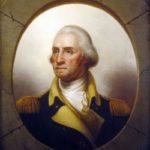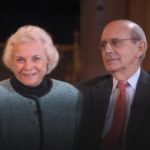An activity where the class gets to vote on hypothetical speech cases in schools based on precedent from six real Supreme Court cases.
Marbury v. Madison
In this lesson, students will view video clips explaining the Supreme Court case Marbury v. Madison. Students will analyze the significance of the case, the precedent it set and its legacy.
“No Event Could Have Filled Me with Greater Anxieties”: George Washington and the First Inaugural Address, April 30, 1789
Phillip Hamilton’s “‘No Event Could Have Filled Me with Greater Anxieties’: George Washington and the First Inaugural Address” reminds us how precedent setting our first president was. Anxious that his lack of administrative experience might make his task as the executive of a new nation difficult, Washington nevertheless proved he was as expert at statesmanship as he was on the battlefield. Free registration for students and teachers required to access resource.
Equal Justice Under Law
In its first constitutional challenge to the equal protection clause of the Fourteenth Amendment, the U.S. Supreme Court decided to hear a case brought by a Chinese immigrant, not an American citizen. Yick Wo believed city ordinances had been unfairly applied to him, so he challenged their constitutionality under the equal protection clause, and took his case all the way to the Supreme Court.
Using Case Studies in the Classroom
Street Law developed seven strategies for teaching about U.S. Supreme Court cases in secondary school classrooms. Use these strategies and Street Law’s case study summaries to supplement civics education about the Supreme Court’s role in the United States.
George Washington and the Presidency

This short video highlights the crucial role played by George Washington in writing upon the “blank slate” of the Constitution. Washington was self-conscious about the importance of establishing principled precedents in his interpretation of Article II and what it said—or did not say—about the extent of executive power. According to Professor W. B. Allen, Washington was “conscious and deliberate” as he and his advisors gave meaning to the outline of the Constitution.
